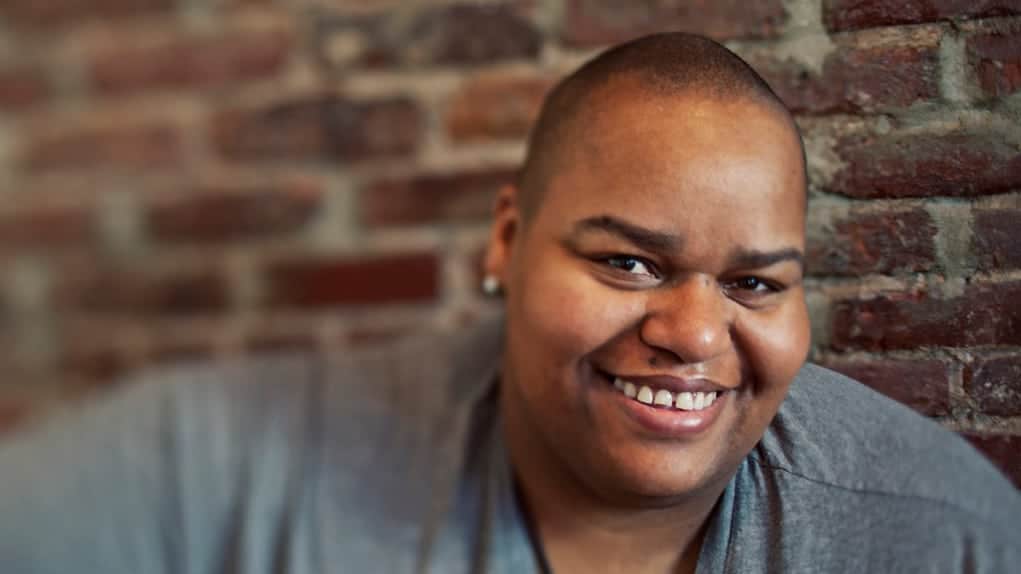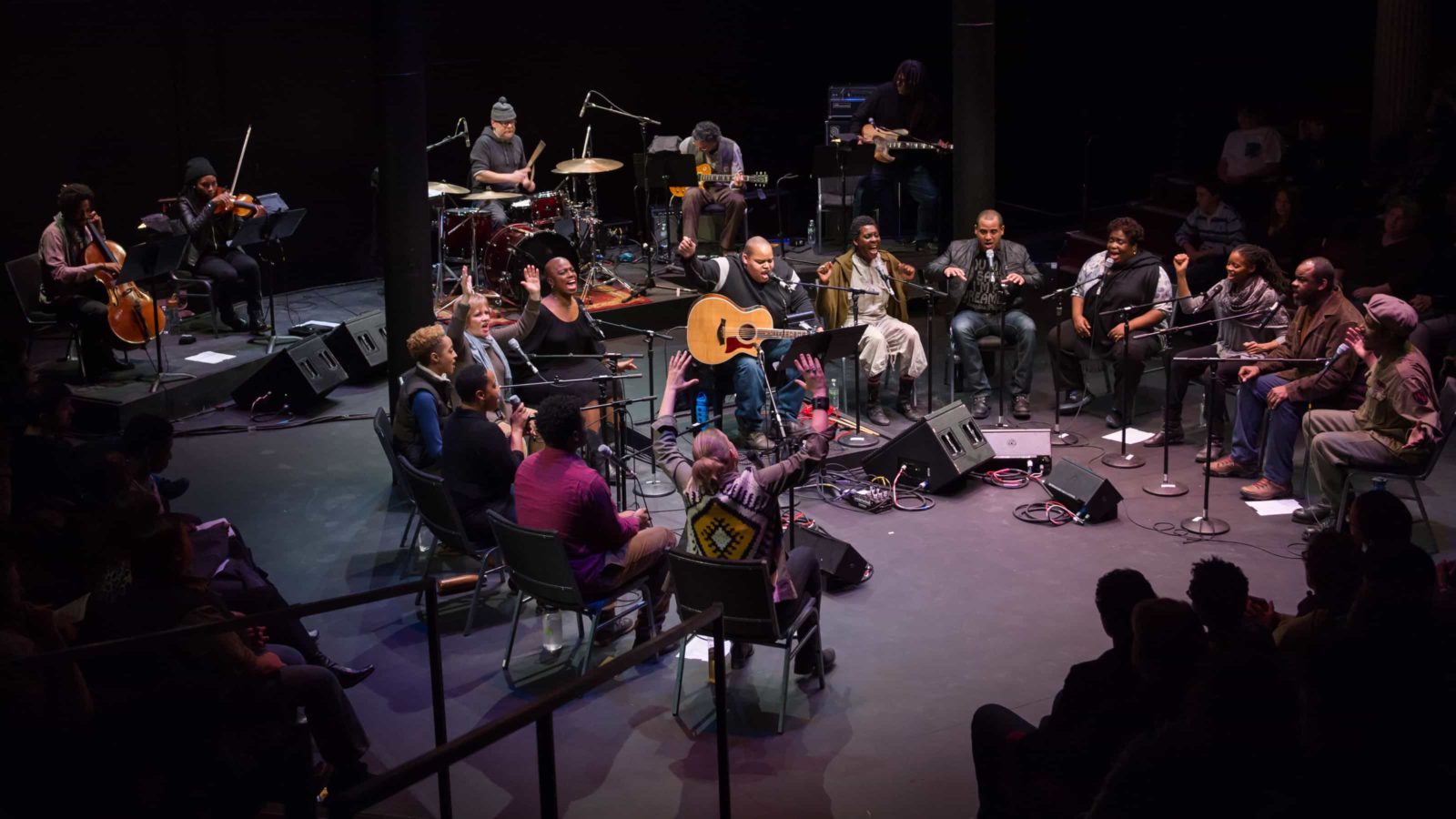Lauren Olamina is 15 when it rains for the first time in six years.
“I’ve never felt so overwhelmed by water,” she says, letting it soak her to the skin. Her father’s congregation sings hymns with the unfamiliar sound of torrents on the roof. It drowns out the usual noise of gunshots.
Lauren lives in a city of rubble, and most of its people survive on the streets. Being clean is a luxury here. Water enough to wash in, soap and clothing without caked-in dirt belong to the upper middle class. Wearing shoes can get someone mugged. And Lauren is doing something very few people in her world know how to. She is writing in her journal.
In Parable of the Sower, Octavia Butler’s 1993 novel, Lauren lives in Southern California in 2024 — in a place that feels within reach now, says nationally acclaimed composer and musician Toshi Reagon.
On a fall night at Williams College, Reagon presented an opera based on Butler’s novel, a sung performance with rock and rhythm and blues, spirituals and gospel, soul, folk, funk and punk — music from 400 years of black American traditions.
In spring and summer 2020, Toshi Reagon and her cast are performing the concert evening again in a range of venues, saying it feels even more timely today.
It is work in progress, she said in a phone interview when she and her cast came to Williamstown. She is writing in collaboration with her mother, Bernice Johnson Reagon, founder of the internationally acclaimed ensemble Sweet Honey in the Rock.
The performance at Williams brought together a cast of 14 vocalists, including Helga Davis, who has also performed at Mass MoCA in Nick Cave’s ‘Until’ installation and has been starring in an international tour of Einstein on the Beach; Morley Kamen, who has performed and traveled from Carnegie Hall to the Nomad Festival in the Sahara; and awardwinning poet, Bessie awardwinning director, Obie-awardwinning playwright, novelist, filmmaker, and actor and musician Carl Hancock Rux, who has held the stage at Mass MoCA more than once, with songs and poetry set to live piano from the blues to Lili Boulanger.
In Butler’s near future, the country is at the edge of collapse. Social structures are crumbling or destroyed. So are houses. Lauren Olamina has grown up in a small enclave that has kept some remnants of learning and order — enough to give them clothing and food, protection, and space to think and dream.
The wall of what once was a gated community has become a palisade, and inside it families protect gardens and fruit trees.
Butler follows the theme of water, Reagon said — how precious it becomes, more than gasoline or gold. She follows basic needs: air, food, shelter, a place to sleep.
“So many so these things are not assured human rights,” Reagon said, in that world and in this one.
The story shows her the costs of an economic structure with no moral code, no center — and they are familiar. Lauren’s family are holding on to basic needs, and around them many people are without basic resources and without anything to do but look for these resources.
“From the political systems we have to this extreme, crazy place, this time,” she said. “Octavia saw its evolution, if people didn’t put their foot down and come together in communities.”

Composer and musician Toshi Reagon presents 'The Parable of the Sower' based on Octavia Butler's novel at Williams College. Photo courtesy of Toshi Reagon
As larger infrastructure fails, people need people to protect and sustain each other. Reagon sees this need clearly.
“It’s all our jobs,” she said. “… It’s why I’m dong this now” — to hold these communications within communities and talk with young people on college campuses who know what needs to be addressed.
Lauren at 15 sees that her community’s way of existence is not sustainable. Their power structure and their relationship with God will have to shift, Reagon said, if they are going to survive and grow. The world outside the wall is changing, and the wall is not going to protect them.
“Older people — we screen our lives,” she said.
Lauren has the courage not to deny danger. And she will survive it, walking up the highway with dried fruit, nuts and water, a gun and ammunition, seeds to plant, a journal and a pen. Reagon finds this catastrophe recognizable too.
“Around the world, kids are put into adult situations all the time,” she said. “They are an economic part of society.”
They are sold; they earn wages; they raise younger brothers and sisters. They are prosecuted as adults and put in prison. In refugee camps, she said, groups of hundreds of children travel by themselves.
“Most kids on this planet are dealing with intense situations,” she said, “violence and destruction on the regular.”
She imagines Lauren like Harriet Tubman, leading people to freedom. Lauren wants to do more than survive. She wants to rebuild — herself, the family she chooses on the way, a larger group, and a structure that can keep them going.
She is learning from the people around her: Zahra, who grew up outside the wall, knows what it takes to stay alive when anyone you see can kill you. Bankole, a mature, intelligent man, meets them on the road and challenges them to risk generosity.
Butler looks openly at sensuality and partnership and what it means to be in love, Reagon said — and what it means to trust someone when everyone is afraid for their lives.
And everyone has lost people they love. While they are traveling, in gun battles, fire, constant threat and adrenaline and exhaustion, Lauren and her people have not been able to think or to take in what they feel.
“It’s a tremendous moment for me,” Reagon said, “when they settle. When they get to a place safe enough to take a deep breath of realization — to look back at what had happened, what they had survived. When they were walking through the fire, they couldn’t, but now they can.”
That is also a human right, she said, to have that space. Butler has imagined a world that is losing it, and seeing that world moves Reagon to action.
“None of us want to live in this world,” she said. “None of us want our children to live in this world. This is such a powerful election. … Knowing this book, I’m concerned for the next 100 years. The next five to 10 years.”
“… We have to activate our generous spirits and prove her a liar, and avoid the catastrophe in that book,” she said. “We have a chance.”
This story first ran in the Berkshire Eagle in November 2016 — my thanks to Arts & Entertainment editor Jeff Borak.

